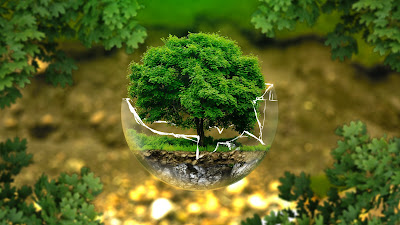The Importance of Environmental Conservation
The Importance of Environmental Conservation
Environmental conservation is a critical issue that affects every living creature on Earth. The health of our planet is directly linked to the well-being of its inhabitants, including humans, animals, and plants. In recent decades, the consequences of environmental neglect have become increasingly evident, from rising global temperatures and extreme weather events to the loss of biodiversity and the pollution of our air and water. Therefore, it is essential that we recognize the importance of environmental conservation and take proactive steps to protect and preserve our natural world.
One of the primary reasons environmental conservation is so crucial is the preservation of biodiversity. Earth is home to an incredible array of species, each playing a unique role in the delicate balance of ecosystems. When we neglect our environment, many of these species face extinction, disrupting the intricate web of life that sustains us all. Biodiversity not only enriches our planet's natural beauty but also provides us with essential resources, such as food, medicine, and raw materials. By conserving the environment, we ensure the survival of countless species and safeguard our own future.
Environmental conservation also directly impacts human health and well-being. Pollution from industrial processes, deforestation, and the burning of fossil fuels has led to poor air and water quality in many regions. This pollution is linked to a range of health problems, including respiratory diseases, cancer, and developmental issues in children. By prioritizing environmental conservation, we can reduce these health risks and create a cleaner, safer world for ourselves and future generations.
Moreover, addressing environmental conservation is vital for mitigating the effects of climate change. The burning of fossil fuels and the release of greenhouse gases into the atmosphere have led to global warming, resulting in rising sea levels, more frequent and severe heatwaves, and unpredictable weather patterns. These changes pose significant threats to communities, economies, and ecosystems. Conservation efforts, such as reforestation, transitioning to renewable energy sources, and adopting sustainable agricultural practices, are essential steps in combating climate change and protecting our planet's future.
In conclusion, environmental conservation is a matter of paramount importance. It safeguards biodiversity, promotes human health, and addresses the urgent issue of climate change. To secure a sustainable future for ourselves and generations to come, we must prioritize the protection and preservation of our environment. This responsibility falls on individuals, communities, governments, and organizations worldwide, working together to ensure that our planet remains a thriving and habitable home for all living beings.
The Importance of Living
Life is a precious gift that should be cherished and valued by every individual. It is a complex and beautiful journey filled with opportunities, experiences, and emotions. Living allows us to explore the world, learn, grow, and connect with others. While the importance of living may seem self-evident, it is worth contemplating the various aspects that make life meaningful.
Living provides us with the chance to pursue our dreams, passions, and goals. It allows us to discover our purpose and contribute positively to society. Every person has unique talents and abilities, and living enables us to harness these gifts to make a difference in the world. Whether it's through creativity, innovation, or acts of kindness, our existence has the potential to leave a lasting impact.
Furthermore, living allows us to build relationships and create bonds with others. These connections are a source of support, love, and companionship. They bring joy and meaning to our lives, reminding us that we are not alone in our journey. The moments shared with friends and family, the laughter and tears, all contribute to the richness of our existence.
Living also gives us the opportunity to learn and grow. It is a continuous process of self-discovery and self-improvement. Challenges and setbacks are inevitable, but they provide valuable lessons that help us become stronger and more resilient. Embracing change and adapting to new circumstances are essential aspects of personal development.
In conclusion, the importance of living cannot be overstated. It encompasses the pursuit of dreams, the cultivation of relationships, personal growth, and the opportunity to make a positive impact on the world. Each day is a gift, and it is up to us to make the most of it.
Why We Must Save Trees:
Trees are often referred to as the lungs of the Earth, and for good reason. They play a crucial role in maintaining the ecological balance of our planet. Trees provide numerous benefits to both the environment and humanity, making their preservation essential.
One of the most significant reasons to save trees is their role in producing oxygen. Through photosynthesis, trees absorb carbon dioxide and release oxygen into the atmosphere. This process is vital for human and animal survival, as we rely on oxygen for respiration. Without trees, the levels of carbon dioxide in the atmosphere would increase, leading to harmful effects such as climate change and air pollution.
Additionally, trees provide habitat and sustenance for a vast array of wildlife. Forests are home to countless species of animals, birds, insects, and plants. By cutting down trees or clearing forests, we disrupt these ecosystems, leading to the loss of biodiversity. This not only threatens the survival of many species but also impacts the delicate balance of nature.
Trees also help in mitigating the effects of climate change by sequestering carbon. As they grow, trees absorb carbon dioxide from the atmosphere and store it in their wood and leaves. This reduces the overall concentration of greenhouse gases, which are a major driver of global warming. Protecting forests and planting more trees is a crucial strategy in the fight against climate change.
Furthermore, trees offer a wide range of practical benefits to humans. They provide us with timber for construction, fruits, nuts, and medicinal plants. Their roots help prevent soil erosion, and their shade can reduce the urban heat island effect in cities. Trees also enhance the aesthetic beauty of our surroundings, contributing to our overall well-being.
In conclusion, saving trees is not just an environmental concern; it is a matter of global importance. Trees are essential for oxygen production, biodiversity, climate change mitigation, and numerous other ecological and human benefits. It is our responsibility to protect and preserve these invaluable natural resources.
In recent years, there has been a significant shift in the world of fashion. It's not just about the latest trends and must-have pieces anymore; it's also about sustainability. As environmental consciousness grows, consumers are demanding eco-friendly and ethical options, leading to a green revolution in the fashion industry.
The Rise of Fast Fashion and Its Consequences
For decades, fast fashion dominated the clothing industry. Brands produced low-cost, trendy garments at an astonishing pace, encouraging consumers to buy more and discard clothing quickly. This rapid turnover had dire consequences for the environment. The fashion industry became one of the largest contributors to pollution, with massive water consumption, textile waste, and carbon emissions.
The Environmental Impact of Fast Fashion
Water Usage: The production of textiles, especially cotton, is incredibly water-intensive. Fast fashion's demand for cheap, readily available fabrics resulted in excessive water usage, leading to water scarcity in many regions.
Textile Waste: With consumers frequently discarding clothing, landfills were inundated with non-biodegradable textiles. Polyester and other synthetic fabrics can take centuries to decompose.
Chemical Pollution: The dyeing and finishing processes in clothing production involve toxic chemicals that often end up contaminating water bodies and harming ecosystems.
Sustainable Fashion: A Game Changer
In response to these environmental crises, sustainable fashion emerged as a compelling alternative. Sustainable clothing brands prioritize ethical production, eco-friendly materials, and responsible practices.
Key Elements of Sustainable Fashion
Eco-Friendly Materials: Sustainable fashion emphasizes the use of organic, recycled, and renewable materials like organic cotton, Tencel, and hemp. These materials reduce the ecological footprint of clothing production.
Fair Labor Practices: Ethical treatment of workers is paramount. Sustainable brands ensure fair wages, safe working conditions, and transparency in their supply chains.
Slow Fashion: Slow fashion encourages consumers to buy less but invest in high-quality, timeless pieces that last. This reduces clothing waste and minimizes the need for constant manufacturing.
Upcycling and Recycling: Some brands repurpose old clothing into new designs or encourage consumers to recycle their old garments, contributing to a circular fashion economy.
Local Production: Locally-made clothing reduces transportation-related emissions and supports local economies.
The Power of Consumer Choices
As consumers, we hold the power to drive change in the fashion industry. By supporting sustainable brands and making informed choices, we can push for a more eco-conscious future. Look for certifications like GOTS (Global Organic Textile Standard) or Fair Trade labels to ensure your clothing aligns with your values.




Comments
Post a Comment